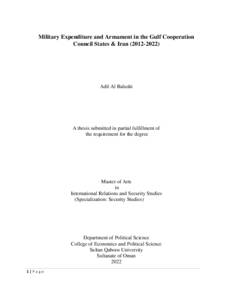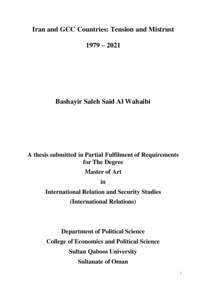Document
Military expenditure and armament in the Gulf Cooperation Council States & Iran (2012-2022).
Publisher
Sultan Qaboos University.
Gregorian
2022
Language
English
Subject
English abstract
Military power is a critical factor in the ability of states to secure their existence and defend
themselves against any potential threats, and imposing its influence on a wide regional and
international scale. Throughout history, the possession and development of weapons played a
prominent and important role in the rise and disappearance of nations from the global political scene.
Nevertheless, the concept of military power has undergone major changes, especially in the 20th
century due to the change in the concept of threats, the factor of possession of weapons, their
manufacture and development has remained a fundamental issue in determining the strength and
status of the state and its ability to defend itself.
After the Cold War, the international system witnessed a change in its nature, as the collapse of the
Soviet Union in 1991 dropped the polar dualism, and the dominant polarity emerged, led by the
United States of America.
The United States was keen on a number of means that enhanced its power and dominance at the
global level and since the oil was the backbone of industry and the economy at the time, the United
States was keen to strengthen and boost its strategic relations with oil-producing countries by
establishing security alliances and military partnerships with them to the extent that what was known
as the "Carter Doctrine", which was stated that the United States has the right to use military force to
defend its interests and oil wealthy states in the Middle East.
For the first time since the founding of the Gulf Cooperation Council, the military forces of all member
states are bringing together for training under a joint command just three years after the founding of
the organization, this military gathering is considered a major achievement. The leaders of the
supreme council indicated at that time that their intention to establish the organization went beyond
cooperation in the "soft" fields to cooperate in the military field, but it was not indicated that there
was any intention of the GCC states to cooperate in the field of defence industries. However, strategic
relations between the United States and the GCC states have deteriorated in recent years for several
reasons, the most important of which are:
Firstly, China's growing role in the economic aspect and its entry into the military sphere, which
represents a real threat to US hegemony in the global arms market. Secondly, the importance of Gulf
oil has declined under the U.S. ability to produce shale oil. Thirdly, the bill for the escalating wars
waged by the United States in the Middle East to protect its interests and those of its allies, for
example the 2001 invasion of Afghanistan and the 2003 invasion of Iraq and its desire for a gradual
withdrawal from the region, and this is what actually happened later, as the United States
permanently withdrew from Afghanistan in 2021.
For the GCC states, Iranian influence is a strategic threat that must be contained and prepared for,
and the Gulf states have long relied on the United States to defend them, but in light of the changes
taking place in the foreign policy of the United States, especially during the period of US President Joe
Biden, in addition to the high ceiling of criticism that affects the GCC states due to their internal
political and social conditions and because of the Yemen war, the access of arms imports to them
from some European countries has been restricted. The GCC states awareness of the need for self reliance on weapons manufacturing is not the result of the moment, or the result of recent changes
in the US strategy towards the region, but there are previous efforts in this field, but they have only
been serious in the recent period. Especially after the sudden US withdrawal from Afghanistan and
the US desire to continue negotiations with Iran increases the fears of the Gulf states.
The gulf region ranks first in potential global hotbeds of tension. It is the world's largest market for oil
exports and arms imports, and is a vital interest for all global powers. Iran is seen as a potential
expansionist threat by the GCC, which has built large militaries in a historically short time frame. For
more than four decades, Iran has pursued contradictory policy positions in the region, while Tehran
has called for an end to the U.S. military presence in the Gulf region, because this presence causes
instability, Iran has been seeking for decades to develop ballistic missile programs that could allow it
to drop NBCR warheads anywhere in the region and reach the heart of Europe. The security dilemma
in the Gulf region, however, is unclear and complicated. The GCC states have pursued different
defence policies as well as different ways of building their armed forces. In some cases, the creation
of a strong army is not only a means of ensuring security, but also a means of building a national
identity.
This research aims to study armament and defense industrialization programs in the countries of the
Arabian Gulf regional system in addition to Iran, Iraq and Turkey through studying military theories
and the elements that make up the security theory or defense policies of countries and military
construction programs.
Also the research raises a set of questions that are summarized in the following points: What are the
areas of military industrialization that exist in each of the GCC states currently? Why do the GCC states
need military industries, and what is the economic, political and security benefit of these industries?
Who are the military industrialization partners to the GCC states and what is the future of military
industrialization in the Gulf? How can the GCC states benefit from the Turkish experience in the
defense industries? To what extent can the GCC states be independent with their military capabilities
without reference to the United States?
Furthermore, the research attempts to answer these questions in order to achieve the following
objectives: To provide an overview of the importance of the military industry in the security strategy
of countries in general and the Gulf states in particular. To shed light and discuss the reality of military
industries in the Gulf states. Finally discuss the opportunities and challenges facing the military
industries in the Gulf and finally foresee the future of the military industries in the Gulf.
Finally, the research aims to propose some alternatives solutions to defence issues in the Gulf region,
especially with regard to the future of defence industries, and to reduce dependence on the United
States and European countries in the matter of arms purchases and looking for strategic partners to
support the emerging defence industry base in the Gulf region.
Member of
Resource URL
Arabic abstract
تحتل منطقة الخليج المرتبة الأولى في بؤرة التوتر العالمية المحتملة. إنها أكبر سوق لصادرات النفط وواردات الأسلحة في تعتبر إيران تهديدًا توسعيًا محتملا العالم وتعتبر مصلحة حيوية لجميع القوى العظمى. من قبل دول مجلس التعاون الخليجي ، التي بنت جيو ًشا كبيرة في إطار زمني قصير تاريخيا، ولطالما عانت دول الخليج من التأثير السلبي للتواجد العسكري ً الأيراني في الدول العربية المحيطة بها. معضلة الدفاع في منطقة الخليج مسألة معقدة. اتبعت دول مجلس التعاون الخليجي سياسات دفاعية مختلفة ، فضالً عن طرق مختلفة لبناء قواتها المسلحة. في بعض الحالأت ، ال يكون إنشاء جيش قوي مجرد وسيلة لضمان الأمن ، ولكنه أي ًضا وسيلة لبناء هوية وطنية يهدف هذا البحث إلى دراسة برامج التصنيع الدفاعي والتسلح والأنفاق في دول المنظومة الأقليمية للخليج العربي بالأضافة إلى إيران والعراق وتركيا من خالل دراسة الأنفاق العسكري والأطالع على الموجودات العسكرية ومعرفة برامج التصنيع الدفاعي حاليا ومستقبال لكل دولة على حده. لدينا إشكالية في عدم قدرة دول الخليج العربية على تلبية أدنى متطلباتهم الدفاعية بدون اللجوء إلى الواليات المتحدة والمعسكر الغربي وصرف مئات الباليين من الدوالرات في صفقات أسلحة تقليدية، وتخصيص نسبة كبيرة )الأعلى عالميا( من الناتج المحلي الأجمالي في الدفاع وهذا بدوره يؤثر سلبا على الأقتصاد في تلك الدول بشكل عام وعلى خطط التنمية المستقبلية. كذلك البحث عن الأسباب في عدم رغبة دول الخليج في تطوير قاعدة صناعتها الدفاعية و التقليل من الأعتماد على واردات الأسلحة من الواليات المتحدة والدول الأوروبية مثل إيطاليا وفرنسا والمملكة المتحدة. هناك رأي يدعو إلى ضرورة بقاء الوجود العسكري الأمريكي في المنطقة ولكن مع هذا الوجود يجب خلق بيئة أمنية جديدة عن طريق تحسين العالقات بين الأطراف الثالثة الواليات المتحدة ودول الخليج وإيران. بالمقابل، يرى بعض المحللين من المتحدة بأمن المنطقة بدأ يقل تدريجياً أن التزام الواليات . ويجب على قادة دول مجلس التعاون أن ال يكونوا على ثقة مطلقة بإن الوجود الأمريكي في المنطقة سيسبب لهم الحماية من أعداء محتملين مثل العراق أو العراق. هذا البحث يتطرق بشكل رئيس إلى إشكالية التصنيع الدفاعي لدى دول مجلس التعاون الخليجي ومقارنة ما لدى تلك الدول من عتاد عسكري بالترسانة العسكرية إليران. لماذا ال تستثمر دول الخليج العربي الأموال الطائلة لبناء صناعات دفاعية متكاملة وتحذو حذو دول سبقتها في هذا المجال منذ عقود مثل تركيا وكوريا الجنوبية بدل إنفاقها على شراء معدات عسكرية باهظة الثمن من الدول الغربية وإنفاق المزيد فيما بعد من أجل تحديثها؟ لماذا ال تسعى دول الخليج العربي إلى جعل الصناعات الدفاعية المتكاملة جزء من برامجها الأقتصادية للتقليل من الأعتماد على النفط وفتح أسواق جديدة لترويج تلك الصناعات بما يسهم في تعزيز إقتصادات دول الخليج المثقلة بالديون والبطالة؟ سوف أسعى في هذا البحث إلى مناقشة هذا الملف الشائك )أسباب إخفاق ونجاح بناء صناعة دفاعية متكاملة لدى دول مجلس التعاون الخليجي( وتقديم بعض الأقتراحات والحلول المناسبة.
Category
Theses and Dissertations


